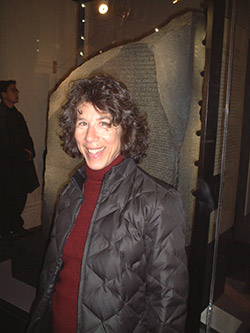TC's Barbara Tversky is Elected to the American Academy of Arts and Sciences
Barbara Tversky, an internationally recognized cognitive psychologist whose expertise includes spatial language and thinking, event perception and cognition, diagram production and comprehension, and gesture, has been elected to the American Academy of Arts and Sciences.
Tversky, TC Professor of Psychology and Education, has helped create a growing field that posits that physical gesture corresponds with and can enhance different kinds of thought processes. For example, studies have shown that, in problem solving, people make characteristic gestures when problem-solving that reveal underlying mental imagery; or that, in people watching others engage in activity, the neurons activated are those that are actually employed in that activity.
"We find in many cases that gestures are superior to words and explanations," Tversky said in 2005 when she joined TC’s Department of Human Development. "They function in retrieving words, increasing spatial memory and structuring a problem. Just making gestures helps your thinking."
Among the 198 members newly elected to the Academy are some of the world’s most accomplished scholars, scientists, writers, artists, and civic, corporate, and philanthropic leaders, including the novelist Martin Amis, the actors Robert De Niro and Sally Field, the singer-songwriters Bruce Springsteen and Pete Seeger, the New Yorker cartoonist Roz Chast and the former astronaut and U.S. Senator John Glenn. The full list of the new members is located here.One of the nation’s most prestigious honorary societies, the Academy is also a leading center for independent policy research. Members contribute to Academy publications and studies of science and technology policy, energy and global security, social policy and American institutions, and the humanities, arts, and education.
Published Monday, Apr. 29, 2013
